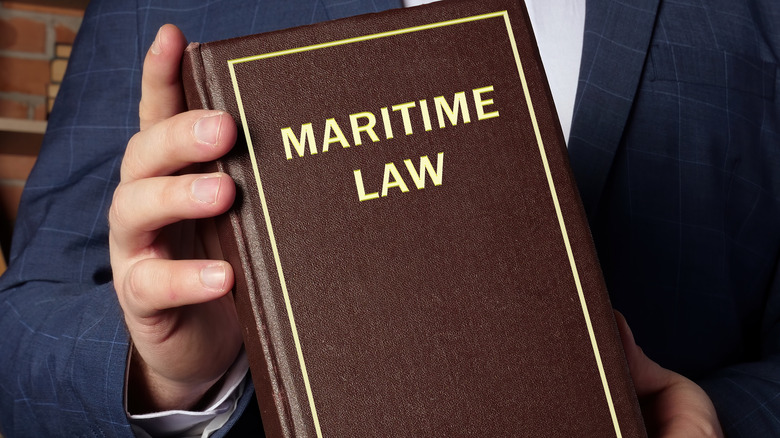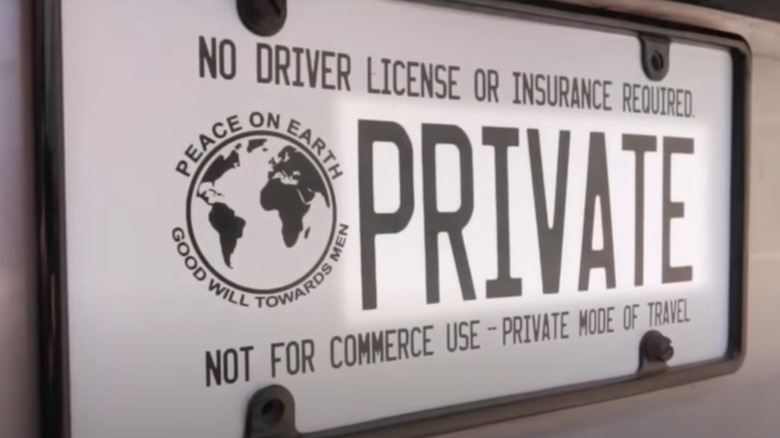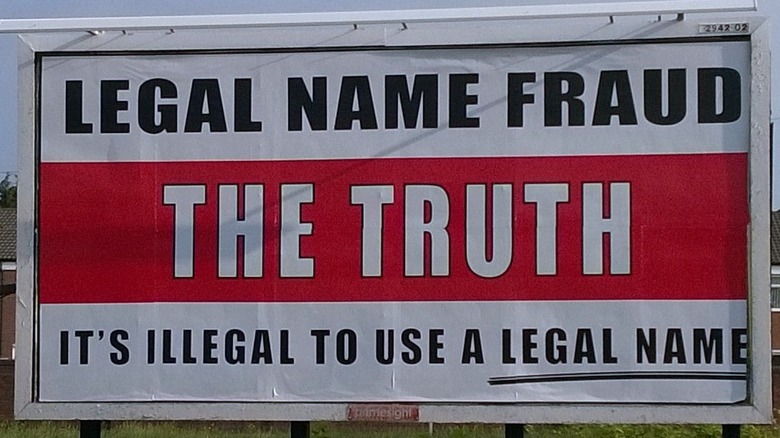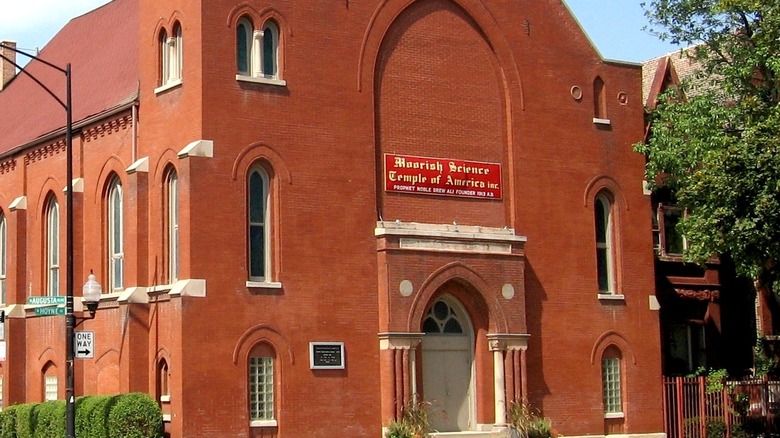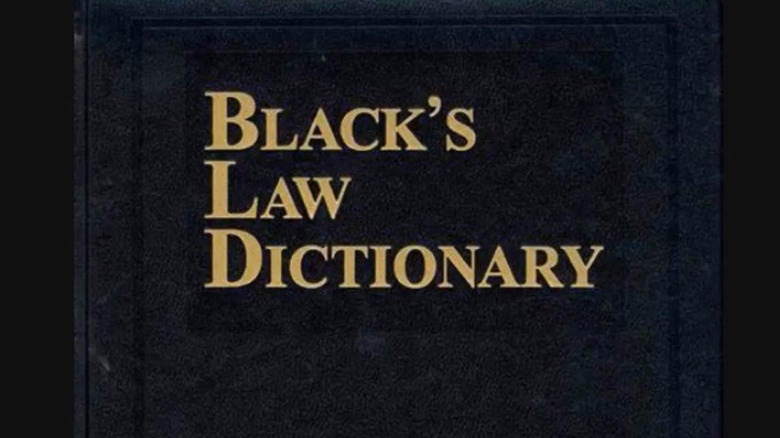The Sovereign Citizen Movement Explained
Life is complicated enough without having to constantly abide by the law, remember to renew the car registration every year, and pay taxes. What if there was a simpler way, where ID is never needed, taxes can be ignored, and driving is a right — with no restrictions or requirements needed? There's a group of people, conspiracy theorists who hail from all over the globe, who think they have the answer: sovereign citizens.
As reported by the BBC, sovereign citizens assert that they are independent and immune from any government of the land they reside in, choosing only to follow a loose definition of common law. Armed with a garbled form of pseudo-law, they cause cognitive dissonance in courtrooms, drive merrily without insurance, scoff at the government, and refuse to sign their name with capital letters. And even more alluring is the promise of a big chunk of change, held in trust under their name by the U.S. Treasury.
The Southern Poverty Law Center estimates that as many as 300,000 people in the U.S. alone identify in some manner as sovereign citizens, encompassing a broad range of backgrounds. They often clash with the law, and some have carried out atrocious acts. Here is an explanation of the sovereign citizen movement.
It is rooted in conspiracies over the 14th amendment and the U.S. gold standard
In the 1970s (per the BBC), a group of white supremacists banded together under the name of Posse Comitatus, led by William Potter Gale, according to the Southern Poverty Law Center. For the most part, they were a particularly abhorrent alliance of racist, antisemitic, and anti-government vigilantes who acted by their own "common" laws. Yet, as their ideology spread, so did its foundation. In the U.S., there are two conspiracy theories, often interchangeable, that are commonly found at the center of the sovereign citizen movement's beliefs.
First, as detailed by the UNC School of Government, is the idea that the 14th Amendment of the U.S. Constitution created two tiers of citizens: sovereign and federal. The latter are said to have been bound to the government by contract, thus negating their access to the benefits and protections of the U.S. Constitution. But by severing any connection with the government, such as driver's licenses or taxes — which are considered contracts — it is claimed that the sovereign class of citizen can be reclaimed, with all its constitutional freedoms.
The other predominant conspiracy theory is a little more complex, but no less bizarre. Supposedly, in the 1930s, the U.S. severed the dollar from the gold standard, which left the U.S. dollar without anything to back it. So instead, the U.S. government put its own citizenry up as collateral, with each person being assigned a U.S. Treasury trust fund under their government-assigned legal name. Each person, therefore, with their assigned "fortune," is an asset upon which the U.S. dollar is pinned.
It is fiercely anti-government
The sovereign citizen movement in the U.S. began in part as an anti-governmental group, called Posse Comitatus, that believed all law is common law and stems from no higher than the county sheriffs, per the Southern Poverty Law Center. They believe they are separate from the government, hence the name "sovereign citizen," regardless of the nation they reside in.
As far as sovereign citizens are concerned, the government has no power over them or their property. They believe they are exempt from tax, do not need to possess any form of I.D., can claim property seemingly at will, and can resolve disputes without the oversight of the legal system. If they find themselves brought before the courts, sovereign citizens often simply dispute or flat-out deny whether it has jurisdiction over them.
This may sound like anarchy, but sovereign citizen groups have made efforts to establish law enforcement and even courts outside the official legal system. The National Liberty Alliance, for example, has been attempting to create common law courts since 2011, as reported by the Southern Poverty Law Center. On one occasion, in 2017, self-proclaimed "Continental Marshals for the Republic" tried unsuccessfully to break one of their members out of a New Mexico jail, posing as legitimate law enforcement officers — replete with fake uniforms and identification.
They think they are above the law
Sovereign citizens in the U.S. believe they are subject only to common law, as established by (or precedent to) the Founding Fathers. In fact, the common law they adhere to is a mix of old English common law and biblical doctrine, with a sprinkle of pseudo-law, as described by the Southern Poverty Law Center.
Furthermore, they assert that courts either lack jurisdiction or are operating under Admiralty law, according to the UNC School of Government. This particular belief stems from a conspiracy theory whereby the original constitutional law was secretly spirited away and replaced with maritime law. The proof for this is supposed to be in plain sight in any courtroom, in the form of a gold-fringed U.S. flag, as reported by Above the Law.
Moorish citizens, a group with similar beliefs, instead assert that they are citizens of a fictional nation. As a result, they have their own passports, driving licenses, and sometimes even dress codes. If they come into contact with the law, they claim — unsuccessfully — they have diplomatic immunity, via a treaty dating back to 1787.
The movement is global
While the sovereign citizen movement has its roots in the U.S., it has since spread to other countries. Per the BBC, followers of sovereign citizen ideology can be found in Australia, the U.K., Canada, and Ireland. Individuals professing sovereign identity have even been reported in Singapore.
In the U.K., for example, they may be identified as "Freeman on the Land" and are known for tax dodging. One local government council in the U.K., Gloucester City Council, details the fruitless efforts by these "Freemen" to avoid paying council tax — the equivalent of property tax in the U.S. — by using the argument that they get to choose what laws they follow, not the government.
On the other side of the globe, Australian police reported (via the BBC) an uptick in sovereign citizen activity in 2020, with officers having to resort to drastic measures to get sovereign citizens to produce identification during traffic stops. And in Canada, one Ottawa man called Walter Derksen, who has expressed sovereign citizen ideas on social media, claimed in court that "he was the Crown," and that he was represented by no less than God, as reported by CBC.
They believe they can drive without a license
Sovereign citizens believe that a driver's license is effectively a form of contract with the government, per the BBC, and an illegitimate government at that. Since they think that severing such contracts can exclude them from the legal system, a license is something to be avoided. The same applies to road tax, license plates, and insurance, with some sporting vehicles with license plates that just say "Private" or some other contrivance.
It may come as little surprise, then, that sovereign citizens often find themselves pulled over in police traffic stops and explaining their lack of proof of their legal ability to drive on a public highway. As the Southern Poverty Law Center describes, their go-to argument is that they are not, in fact, driving: They are traveling. So when is driving not driving, but simply traveling? According to sovereign citizens, the term "driving" only applies if they are engaged in commerce — otherwise, they are traveling.
Taking such an approach may often end with the driver relenting and producing a genuine license or getting a ticket, and in some instances, the driver being physically removed from their car (as reported by the BBC). But it can turn much uglier: In 2010, two sovereign citizens — Jerry Kane and his son Joseph Kane — were stopped by Arkansas police in a routine traffic stop. As reported by The Guardian, it ended in a bloody shootout, with two officers dead, as well as both the Kanes.
Everyone has a secret fortune held by the government
As described by the Southern Poverty Law Center, sovereign citizen doctrine includes the promise of a big pot of gold that all U.S. citizens can access, held by the government in a secret account. The theory rests on the idea that after actual gold was dropped as the backer for the U.S. dollar, the government chose another form of collateral for its currency: people.
According to sovereign citizen groups, from birth, each U.S. citizen is assigned a secret Treasury account, containing anywhere from several hundred thousand dollars to millions of dollars. This supposed corporate trust account is placed under an administrative version of the person's identity — a "strawman" — that binds the individual to the government and their corporate treasure trove, as detailed by the UNC School of Government.
However, this fictional nest egg is unobtainable to the average person — unless they completely divest themselves from the government. This requires the potential treasure seeker to avoid all official legal ties — legitimate ones — such as driver's licenses. If they have to agree to anything, great pain is taken to sign their names in a manner that does not associate them with their "corporate" identity. By doing so, it is believed that they will be in a position to access the secret account, by filing complex pseudo-legal documents with the same courts that they despise.
Your legal name is a fictional identity
It turns out, sovereign citizens claim, that we have two identities: our physical, flesh-and-bone self, and our false, government-created corporate self, as detailed by the UNC School of Government. The latter is sometimes referred to as a "federal citizen," whereas the former is the identity we should strive to protect: the "sovereign citizen."
One important consequence of the dual identity that sovereign citizens believe in is that the federal citizen is a "strawman," to which the government pins all its pesky laws and obligations. If you can separate yourself from this corporate identity, as the theory goes, you can also do away with any legal obligations, such as paying taxes.
A citizen's fake government identity is believed to be identified by their name being spelled in all capital letters. So, to divest themselves of their corporate identity, sovereign citizens may insist on spelling their name with no capital letters, or use red ink. As described by the Southern Poverty Law Center, some even sign their names with thumbprints, or written out in such a way as to identify themselves as an agent for their corporate identity.
Sovereign citizens are known to tie up the courts with legal mumbo-jumbo
Sovereign citizens refuse to acknowledge the legitimacy of their government's legal system, and often directly challenge the jurisdiction of any court they may find themselves in. Whether it is deliberate vexatious litigation — termed "paper terrorism" — or a misguided legal defense, sovereign citizens have curated a variety of bizarre legal terminology to confound the legal system, according to the Southern Poverty Law Center.
Typically, the approach taken by sovereign citizens, when dealing with the courts, is filing vast amounts of pages of garbled pseudo-law, which the courts — to some extent — are obliged to respond to. And it sometimes works: In one instance, a sovereign citizen from Arkansas managed to drag out a simple court case, over a dog license, for more than two months. The lady, called Donna Lee Wray, effectively buried the prosecutor under a mountain of legal gibberish until they threw in the towel, allowing Wray to walk away without having to pay the license fee — saving $20.
The courts do try to fight back against this behavior, in some cases by handing down hefty fines for the misuse of the legal system. In Calgary, Canada, a millionaire heiress called Sandra-Ann Anderson was, in August 2022, given a $40,000 fine for excessive and malicious use of pseudo-law, as reported by the Calgary Herald.
It has become more diverse in recent times
While its origins are tied with white supremacism, the ideologies of the sovereign citizen movement span racial and political boundaries. As the ideas and motivations behind sovereign identity evolved over time, its membership has grown to include a younger and more diverse demographic, summed up by one former senior law enforcement officer, Bob Paudert, who told The Guardian: "Their only agenda is they are anti-government."
North Carolina, in particular, is host to the Moorish Nation and the Washitaw Nation. With institutions such as the Moorish Science Temple as their nexus, young Black Americans are increasingly being recruited into these sovereign citizen groups, per the UNC School of Government. In addition, conspiracy theorists such as Alex Jones, who aggressively decry government control to a broad online audience, are promoting an extreme anti-governmental way of life to a younger and more heterogeneous crowd.
The perceived benefits of embracing a sovereign citizen lifestyle are promoted as being applicable to all, and the approach can also be tinkered with. For example, the North-Carolina American Republic, based in Mooresville, North Carolina, has effectively declared itself as the true legitimate government of North Carolina, thus invalidating the jurisdiction of the existing state's government. Proclaimed citizens of these "nations" will often carry their own unique — and legally invalid — identification, and claim diplomatic immunity if charged with a crime.
It can turn violent
As reported by the BBC, the denial of governmental authority by sovereign citizens usually manifests itself by refusing to abide by tax, property, and transportation laws. However, it can sometimes lead to more direct and violent action against a perceived tyrannical government, such as the Oklahoma City bombing in 1995, which was partly masterminded by Terry Nichols — a self-professed sovereign citizen — and left 168 innocent people dead.
More recently, Darrell Brooks, who killed six people with an SUV at a parade in Wisconsin in 2021, has claimed to be a sovereign citizen in court, as reported by CBS 58. However, while Nichols was motivated to carry out his heinous act by his sovereign ideology, the behavior of Brooks in court appears to be more of an attempt to avoid justice by denying its authority over him. As attorney Julius Kim told CBS 58 in an interview, "That's why you hear Mr. Brooks ask questions asking if [Judge Dorow] has ever taken an oath, he's trying to test her legitimacy."
The Uniform Commercial Code and Black's Law Dictionary are canon
Sovereign citizens in the U.S. believe that a secret fund is held, in trust, under their name by the government, as described by the UNC School of Government. This trust account is supposed to be large — very large, as much as several million dollars, according to some sovereign citizen groups. Such a large financial incentive has generated a substantial amount of legal activity by sovereign citizens to get their hands on this illusory fortune. And a lot of it centers around the somewhat unlikely UCC, or Uniform Commercial Code.
The UCC is simply a standardized commercial transaction framework established in the 1950s, to ease the process of securing collateral for loans. According to FBI training literature, this system is abused by sovereign citizens, who file fraudulent — although technically legitimate — UCC filings for numerous illegal purposes, including the attempt to wrest control of their fantasy corporate trust account. The UCC is also used by sovereign citizens to fraudulently claim property that does not belong to them, and to prevent the collection of debts they may owe.
Another favorite go-to for sovereign citizens is "Black's Law Dictionary," as mentioned by the UNC School of Government, which has no actual legal weight and is simply what it says it is ... a dictionary.
They often represent themselves in court -- badly
Sovereign citizens often believe lawyers to be as illegitimate as the courts and judges, as detailed by the Penn State Law Review. While their involvement in vexatious and fraudulent litigation is common, sometimes they find themselves before the justice system for more conventional reasons, ranging from traffic tickets to serious felonies. And when they do, they typically prefer to represent themselves in court, though, armed only with pseudo-law and conspiracy theories, this doesn't usually end well for them.
As described by The Conversation, misusing legal jargon is a hallmark of a sovereign citizen defense in court. One legal term sometimes thrown into the mix is "corpus delicti," such as by one individual captured on videoed court proceedings (via the attorney-hosted YouTube channel Law Talk With Mike), who runs into a wall of actual, concrete legal knowledge — in the shape of a judge. Facing the real, physical possibility of being jailed for contempt, the defendant soon backs down.
Per the Southern Poverty Law Center, U.S. sovereign citizens believe all individuals possess two distinct identities — one real, and the other a fake government construct. This can also lead to some bizarre legal strategies by sovereign citizens, who attempt to identify themselves as someone — or something — else other than themselves. An example in one bond hearing, captured on video (via Law Talk With Mike), ends with the judge not only humoring the defendant's argument, but even incorporating it into his ruling: revocation of bond.



